情绪动词、关系代名词、形容词句子
- 格式:ppt
- 大小:706.00 KB
- 文档页数:28
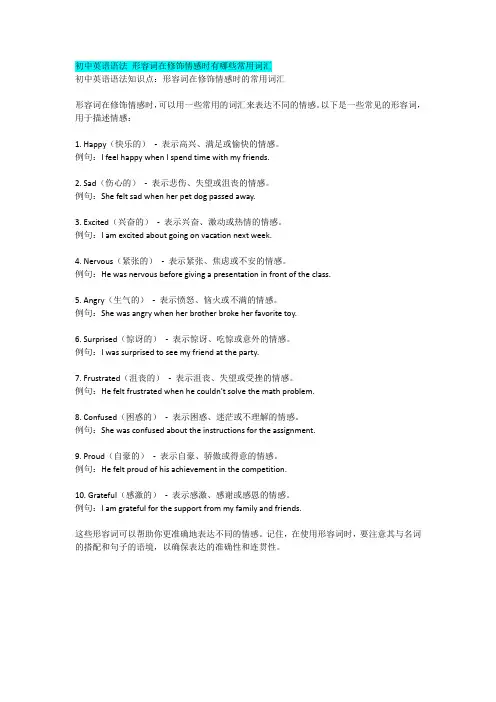
初中英语语法形容词在修饰情感时有哪些常用词汇初中英语语法知识点:形容词在修饰情感时的常用词汇形容词在修饰情感时,可以用一些常用的词汇来表达不同的情感。
以下是一些常见的形容词,用于描述情感:1. Happy(快乐的)-表示高兴、满足或愉快的情感。
例句:I feel happy when I spend time with my friends.2. Sad(伤心的)-表示悲伤、失望或沮丧的情感。
例句:She felt sad when her pet dog passed away.3. Excited(兴奋的)-表示兴奋、激动或热情的情感。
例句:I am excited about going on vacation next week.4. Nervous(紧张的)-表示紧张、焦虑或不安的情感。
例句:He was nervous before giving a presentation in front of the class.5. Angry(生气的)-表示愤怒、恼火或不满的情感。
例句:She was angry when her brother broke her favorite toy.6. Surprised(惊讶的)-表示惊讶、吃惊或意外的情感。
例句:I was surprised to see my friend at the party.7. Frustrated(沮丧的)-表示沮丧、失望或受挫的情感。
例句:He felt frustrated when he couldn't solve the math problem.8. Confused(困惑的)-表示困惑、迷茫或不理解的情感。
例句:She was confused about the instructions for the assignment.9. Proud(自豪的)-表示自豪、骄傲或得意的情感。
例句:He felt proud of his achievement in the competition.10. Grateful(感激的)-表示感激、感谢或感恩的情感。
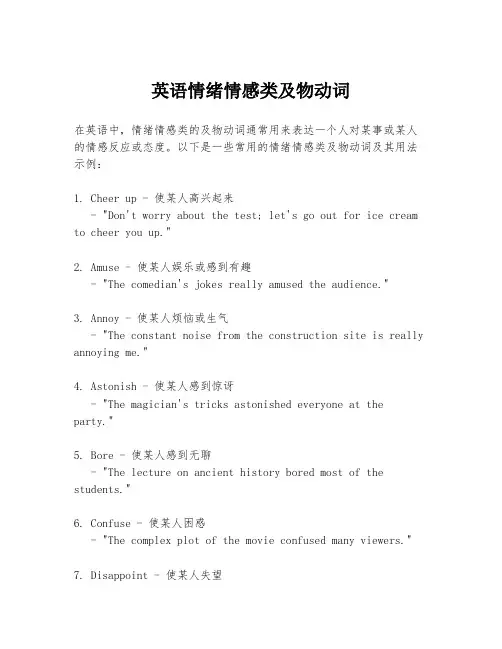
英语情绪情感类及物动词在英语中,情绪情感类的及物动词通常用来表达一个人对某事或某人的情感反应或态度。
以下是一些常用的情绪情感类及物动词及其用法示例:1. Cheer up - 使某人高兴起来- "Don't worry about the test; let's go out for ice cream to cheer you up."2. Amuse - 使某人娱乐或感到有趣- "The comedian's jokes really amused the audience."3. Annoy - 使某人烦恼或生气- "The constant noise from the construction site is really annoying me."4. Astonish - 使某人感到惊讶- "The magician's tricks astonished everyone at the party."5. Bore - 使某人感到无聊- "The lecture on ancient history bored most of the students."6. Confuse - 使某人困惑- "The complex plot of the movie confused many viewers."7. Disappoint - 使某人失望- "The team's loss in the final game disappointed their fans."8. Excite - 使某人兴奋- "The announcement of the new project excited the whole team."9. Frighten - 使某人害怕- "The sudden thunderstorm frightened the children."10. Inspire - 激励或鼓舞某人- "Her story of perseverance inspired many to overcome their challenges."11. Mortify - 使某人感到羞愧或尴尬- "He was mortified when he realized he had spilled coffee on his shirt."12. Sadden - 使某人感到悲伤- "The news of the old friend's passing saddened everyone."13. Shock - 使某人震惊- "The unexpected resignation of the CEO shocked the company."14. Touch - 感动某人- "The heartfelt speech touched the audience deeply."15. Worry - 使某人担心- "The economic downturn is worrying many investors."这些动词在描述情感反应时非常重要,它们帮助我们更准确地表达我们对不同情境的感受。

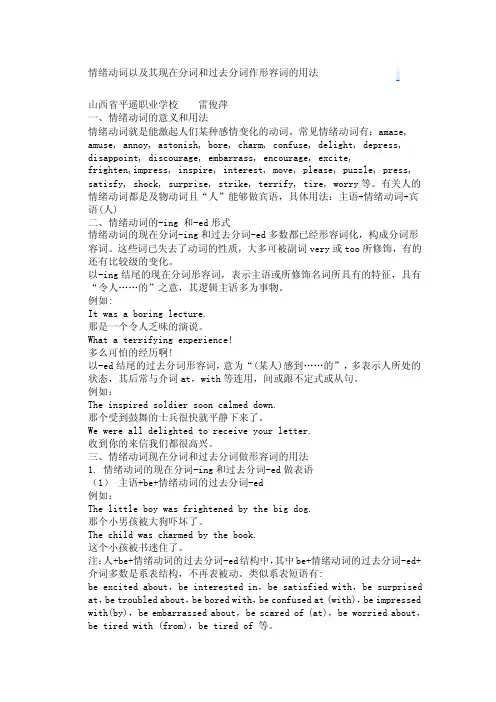
情绪动词以及其现在分词和过去分词作形容词的用法山西省平遥职业学校雷俊萍一、情绪动词的意义和用法情绪动词就是能激起人们某种感情变化的动词。
常见情绪动词有:amaze, amuse, annoy, astonish, bore, charm, confuse, delight, depress, disappoint, discourage, embarrass, encourage, excite,frighten,impress, inspire, interest, move, please, puzzle, press, satisfy, shock, surprise, strike, terrify, tire, worry等。
有关人的情绪动词都是及物动词且“人”能够做宾语,具体用法:主语+情绪动词+宾语(人)二、情绪动词的-ing 和-ed形式情绪动词的现在分词-ing和过去分词-ed多数都已经形容词化,构成分词形容词。
这些词已失去了动词的性质,大多可被副词very或too所修饰,有的还有比较级的变化。
以-ing结尾的现在分词形容词,表示主语或所修饰名词所具有的特征,具有“令人……的”之意,其逻辑主语多为事物。
例如:It was a boring lecture.那是一个令人乏味的演说。
What a terrifying experience!多么可怕的经历啊!以-ed结尾的过去分词形容词,意为“(某人)感到……的”,多表示人所处的状态,其后常与介词at,with等连用,间或跟不定式或从句。
例如:The inspired soldier soon calmed down.那个受到鼓舞的士兵很快就平静下来了。
We were all delighted to receive your letter.收到你的来信我们都很高兴。
三、情绪动词现在分词和过去分词做形容词的用法1. 情绪动词的现在分词-ing和过去分词-ed做表语(1)主语+be+情绪动词的过去分词-ed例如:The little boy was frightened by the big dog.那个小男孩被大狗吓坏了。
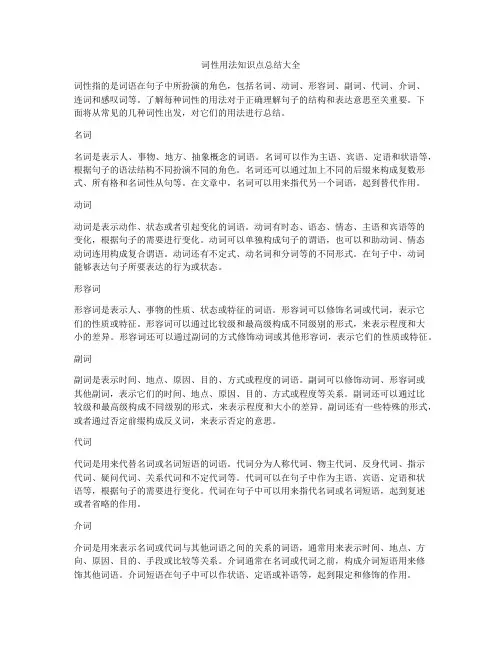
词性用法知识点总结大全词性指的是词语在句子中所扮演的角色,包括名词、动词、形容词、副词、代词、介词、连词和感叹词等。
了解每种词性的用法对于正确理解句子的结构和表达意思至关重要。
下面将从常见的几种词性出发,对它们的用法进行总结。
名词名词是表示人、事物、地方、抽象概念的词语。
名词可以作为主语、宾语、定语和状语等,根据句子的语法结构不同扮演不同的角色。
名词还可以通过加上不同的后缀来构成复数形式、所有格和名词性从句等。
在文章中,名词可以用来指代另一个词语,起到替代作用。
动词动词是表示动作、状态或者引起变化的词语。
动词有时态、语态、情态、主语和宾语等的变化,根据句子的需要进行变化。
动词可以单独构成句子的谓语,也可以和助动词、情态动词连用构成复合谓语。
动词还有不定式、动名词和分词等的不同形式。
在句子中,动词能够表达句子所要表达的行为或状态。
形容词形容词是表示人、事物的性质、状态或特征的词语。
形容词可以修饰名词或代词,表示它们的性质或特征。
形容词可以通过比较级和最高级构成不同级别的形式,来表示程度和大小的差异。
形容词还可以通过副词的方式修饰动词或其他形容词,表示它们的性质或特征。
副词副词是表示时间、地点、原因、目的、方式或程度的词语。
副词可以修饰动词、形容词或其他副词,表示它们的时间、地点、原因、目的、方式或程度等关系。
副词还可以通过比较级和最高级构成不同级别的形式,来表示程度和大小的差异。
副词还有一些特殊的形式,或者通过否定前缀构成反义词,来表示否定的意思。
代词代词是用来代替名词或名词短语的词语。
代词分为人称代词、物主代词、反身代词、指示代词、疑问代词、关系代词和不定代词等。
代词可以在句子中作为主语、宾语、定语和状语等,根据句子的需要进行变化。
代词在句子中可以用来指代名词或名词短语,起到复述或者省略的作用。
介词介词是用来表示名词或代词与其他词语之间的关系的词语,通常用来表示时间、地点、方向、原因、目的、手段或比较等关系。
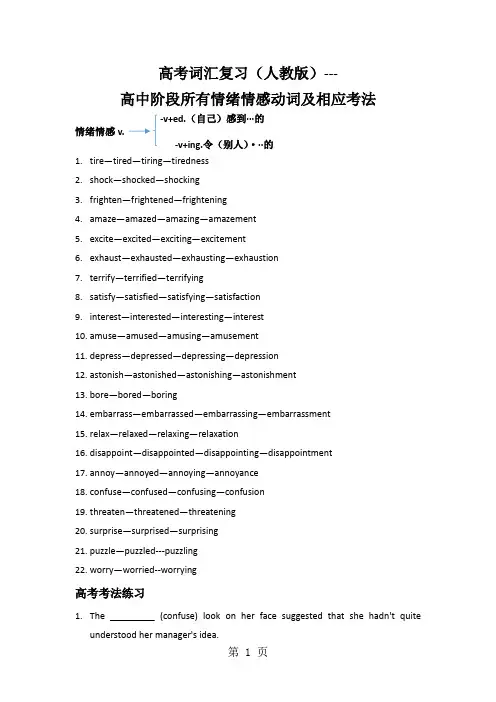
高考词汇复习(人教版)---高中阶段所有情绪情感动词及相应考法-v+ed.(自己)感到···的情绪情感v.-v+ing.令(别人)···的1.tire—tired—tiring—tiredness2.shock—shocked—shocking3.frighten—frightened—frightening4.amaze—amazed—amazing—amazement5.excite—excited—exciting—excitement6.exhaust—exhausted—exhausting—exhaustion7.terrify—terrified—terrifying8.satisfy—satisfied—satisfying—satisfaction9.interest—interested—interesting—interest10.amuse—amused—amusing—amusement11.depress—depressed—depressing—depression12.astonish—astonished—astonishing—astonishment13.bore—bored—boring14.embarrass—embarrassed—embarrassing—embarrassment15.relax—relaxed—relaxing—relaxation16.disappoint—disappointed—disappointing—disappointment17.annoy—annoyed—annoying—annoyance18.confuse—confused—confusing—confusion19.threaten—threatened—threatening20.surprise—surprised—surprising21.puzzle—puzzled---puzzling22.worry—worried--worrying高考考法练习1.The _________ (confuse) look on her face suggested that she hadn't quiteunderstood her manager's idea.2.They asked me so many ___ (confuse) questions that I got _______(confuse) at last.3.The children were ___ (tire)after the trip.4.The ___ (tire)trip lasted a whole day.5.The trip made the children ___ (tire).6.The bad weather made the trip ___ (tire).7.Tom’s parents are ___ (tire)at his ___ (tire)results of theexams.8.___ (disappoint)and angry, he left the meeting-room.9.It is ___ (disappoint)that he didn’t pass the examination.10.When hearing the ___ (surprise)news that Michael Jackson passedaway, they were to look at each other.11.He was ___ (worry)about his ___ (worry)son.答案:1.confused2.confusing, confused3.tired4.tiring5.tired6.tiring7.tired, tiring8.disappointed9.disappointing10.surprising11.worried, worrying12.。
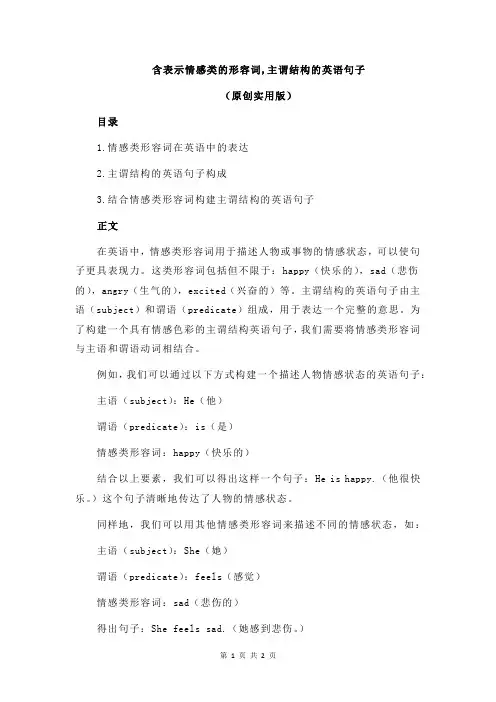
含表示情感类的形容词,主谓结构的英语句子
(原创实用版)
目录
1.情感类形容词在英语中的表达
2.主谓结构的英语句子构成
3.结合情感类形容词构建主谓结构的英语句子
正文
在英语中,情感类形容词用于描述人物或事物的情感状态,可以使句子更具表现力。
这类形容词包括但不限于:happy(快乐的),sad(悲伤的),angry(生气的),excited(兴奋的)等。
主谓结构的英语句子由主语(subject)和谓语(predicate)组成,用于表达一个完整的意思。
为了构建一个具有情感色彩的主谓结构英语句子,我们需要将情感类形容词与主语和谓语动词相结合。
例如,我们可以通过以下方式构建一个描述人物情感状态的英语句子:主语(subject):He(他)
谓语(predicate):is(是)
情感类形容词:happy(快乐的)
结合以上要素,我们可以得出这样一个句子:He is happy.(他很快乐。
)这个句子清晰地传达了人物的情感状态。
同样地,我们可以用其他情感类形容词来描述不同的情感状态,如:主语(subject):She(她)
谓语(predicate):feels(感觉)
情感类形容词:sad(悲伤的)
得出句子:She feels sad.(她感到悲伤。
)
主语(subject):They(他们)
谓语(predicate):get(变得)
情感类形容词:excited(兴奋的)
得出句子:They get excited.(他们变得兴奋。
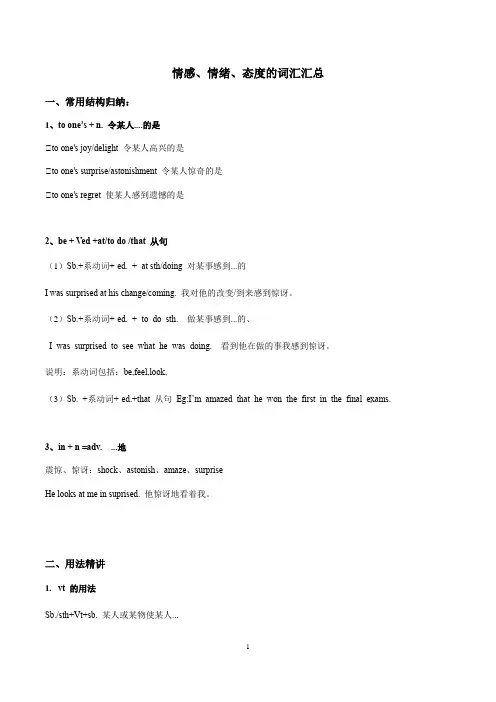
情感、情绪、态度的词汇汇总一、常用结构归纳:1、to one’s + n. 令某人....的是①to one's joy/delight 令某人高兴的是②to one's surprise/astonishment 令某人惊奇的是③to one's regret 使某人感到遗憾的是2、be + Ved +at/to do /that 从句(1)Sb.+系动词+-ed. + at sth/doing 对某事感到...的I was surprised at his change/coming. 我对他的改变/到来感到惊讶。
(2)Sb.+系动词+-ed. + to do sth. 做某事感到...的、I was surprised to see what he was doing. 看到他在做的事我感到惊讶。
说明:系动词包括:be,feel,look,(3)Sb. +系动词+-ed.+that 从句Eg:I’m amazed that he won the first in the final exams.3、in + n =adv. ...地震惊、惊讶:shock、astonish、amaze、surpriseHe looks at me in suprised. 他惊讶地看着我。
二、用法精讲1.vt 的用法Sb./sth+Vt+sb. 某人或某物使某人...eg: Mary moved us.玛丽使我们感动。
His words embarrassed me.他的话让我很尴尬。
2.vt.→adj.-ed 感到....的,修饰人,句子的主语通常是人(人的表情也用-ed)。
-ing 令人感到....的,修饰物,句子的主语通常是物。
amaze使惊讶→amazing令人惊讶的→amazed惊讶的;感到惊讶的annoy 使生气→annoying令人生气的→annoyed=angry生气的bore 使无聊→boring令人感到无聊的→bored感到无聊的confuse 使糊涂使困惑→confusing令人困惑的;费解的混乱的→confused感到困惑的/糊涂的convince 使确信;使信服→convincing令人信服的;有说服力的→convinced感到信服的disappoint 使失望→disappointing令人失望的→disappointed感到失望的discourage 使泄气;使沮丧→discouraging令人泄气的;灰心的;→discouraged感到泄气的disgust 使厌恶;使憎恶→disgusting令人厌恶的;令人作呕的→disgusted感到厌恶的/憎恶的embarrass 使尴尬→embarrassing令人尴尬的→embarrassed感到尴尬的excite 使兴奋→exciting令人感到兴奋的→excited 兴奋的;感到兴奋的exhaust 使精疲力竭→exhausting令人筋疲力尽的→exhausted感到筋疲力尽的fascinate 使着迷→fascinating令人着迷的→fascinated着迷的frighten 使惊恐使害怕→frightening令人惊恐的;令人害怕的→frightened感到受惊的/害怕的frustrate使灰心;使沮丧;使愤怒→frustrating挫败的,泄气的→frustrated感到挫败的,泄气的interest 使产生兴趣interesting →令人感兴趣的→interested对...感兴趣的move 使感动→moving令人感动的→moved感动的puzzle 使迷惑;使困惑→puzzling使为难的,费解的→puzzled感到迷惑的/困惑的relax 使放松→relaxing令人放松的→relaxed 放松的;感到放松的shock 使震惊→shocking令人震惊的→shocked感到震惊的surprise 使惊讶→surprising令人惊讶的→surprised惊讶的;感到惊讶的thrill 使狂喜;使激动;使极度兴奋→thrilling扣人心弦的;激动人心的→thrilled感到欣喜若狂/非常开心的tire 使疲劳→tiring令人疲劳的→tired感到疲劳的touch 使触动→touching令人触动的→touched触动的worry 使担忧→worrying令人担忧的→worried感到担忧的特殊变化:please→pleasing=pleasant→pleasedscare→scary→scaredsatisfy→satisfying=satisfactory→satisfieddelight使高兴;使愉快;使快乐delightful 令人高兴的delighted 高兴的愉快的(4)Sth makes/keeps sb +-ed. He often makes us interested in his classes.(5)和介词的搭配be surprised/amazed at 对...感到吃惊be embarrassed about/at 对...感到尴尬be excited/thrilled about/at 对....感到激动兴奋be shocked at 对..感到震惊be interested in 对...感兴趣be pleased/happy/satisfied with对....感到高兴满意be tired with/from由于....感到疲倦be exhausted from/with 因...筋疲力尽be fascinated with 对....着迷/动心be delighted with sb./sth 对...感到高兴be disgusted with 对...感到厌恶be annoyed=angry with 对...感到愤怒生气be scared/terrified/afraid/frightened of 对.....感到害怕/恐惧be tired of 对....感到厌倦be tired out/be exhausted 筋疲力尽be bored with 对....感到厌烦be moved/touched by 被...感动be moved/touched to tears 感动得流下了眼泪be deeply moved深深地感动了be relaxed about 对 ....感到放松be shocked by 被...震惊be shocked to do sth.震惊地做某事be worried about =worry about 担心... ,对...感到焦虑/担心be fascinated in/by 被...迷住be delighted for sb.为.。
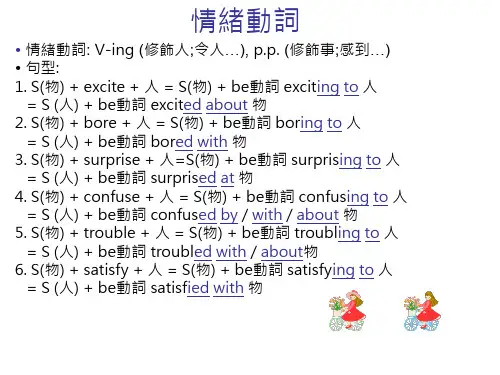
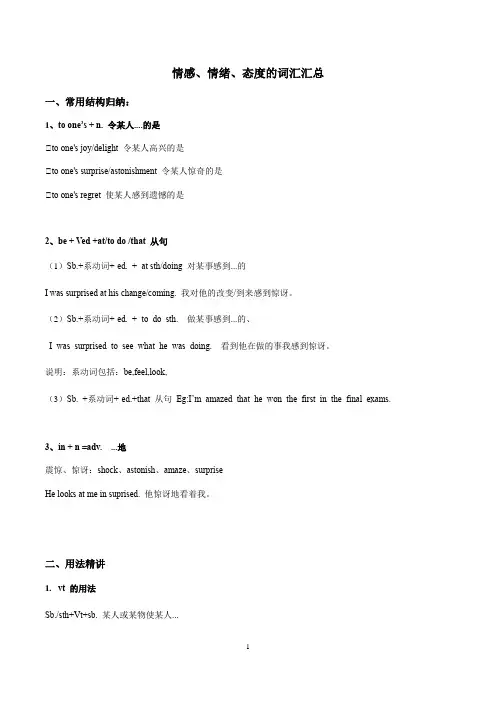
情感、情绪、态度的词汇汇总一、常用结构归纳:1、to one’s + n. 令某人....的是①to one's joy/delight 令某人高兴的是①to one's surprise/astonishment 令某人惊奇的是①to one's regret 使某人感到遗憾的是2、be + Ved +at/to do /that 从句(1)Sb.+系动词+-ed.+at sth/doing 对某事感到...的I was surprised at his change/coming. 我对他的改变/到来感到惊讶。
(2)Sb.+系动词+-ed.+to do sth. 做某事感到...的、I was surprised to see what he was doing. 看到他在做的事我感到惊讶。
说明:系动词包括:be,feel,look,(3)Sb.+系动词+-ed.+that从句Eg:I’m amazed that he won the first in the final exams.3、in + n =adv. ...地震惊、惊讶:shock、astonish、amaze、surpriseHe looks at me in suprised. 他惊讶地看着我。
二、用法精讲1.vt的用法Sb./sth+Vt+sb.某人或某物使某人...eg:Mary moved us.玛丽使我们感动。
His words embarrassed me.他的话让我很尴尬。
2.vt.→adj.-ed感到....的,修饰人,句子的主语通常是人(人的表情也用-ed)。
-ing 令人感到....的,修饰物,句子的主语通常是物。
amaze使惊讶→amazing令人惊讶的→amazed惊讶的;感到惊讶的annoy 使生气→annoying 令人生气的→annoyed=angry生气的bore 使无聊→boring 令人感到无聊的→bored感到无聊的confuse使糊涂使困惑→confusing令人困惑的;费解的混乱的→confused感到困惑的/糊涂的convince使确信;使信服→convincing令人信服的;有说服力的→convinced感到信服的disappoint使失望→disappointing令人失望的→disappointed感到失望的discourage使泄气;使沮丧→discouraging令人泄气的;灰心的;→discouraged感到泄气的disgust使厌恶;使憎恶→disgusting令人厌恶的;令人作呕的→disgusted感到厌恶的/憎恶的embarrass 使尴尬→embarrassing 令人尴尬的→embarrassed 感到尴尬的excite 使兴奋→exciting 令人感到兴奋的→excited兴奋的;感到兴奋的exhaust 使精疲力竭→exhausting令人筋疲力尽的→exhausted感到筋疲力尽的fascinate 使着迷→fascinating 令人着迷的→fascinated着迷的frighten使惊恐使害怕→frightening令人惊恐的;令人害怕的→frightened感到受惊的/害怕的frustrate使灰心;使沮丧;使愤怒→frustrating挫败的,泄气的→frustrated感到挫败的,泄气的interest 使产生兴趣interesting →令人感兴趣的→interested对...感兴趣的move 使感动→moving 令人感动的→moved感动的puzzle使迷惑;使困惑→puzzling使为难的,费解的→puzzled感到迷惑的/困惑的relax 使放松→relaxing 令人放松的→relaxed放松的;感到放松的shock 使震惊→shocking 令人震惊的→shocked感到震惊的surprise 使惊讶→surprising 令人惊讶的→surprised惊讶的;感到惊讶的thrill使狂喜;使激动;使极度兴奋→thrilling扣人心弦的;激动人心的→thrilled感到欣喜若狂/非常开心的tire 使疲劳→tiring 令人疲劳的→tired感到疲劳的touch 使触动→touching 令人触动的→touched触动的worry 使担忧→worrying 令人担忧的→worried感到担忧的特殊变化:please→pleasing=pleasant→pleasedscare→scary→scaredsatisfy→satisfying=satisfactory→satisfieddelight使高兴;使愉快;使快乐delightful令人高兴的delighted高兴的愉快的(4)Sth makes/keeps sb+-ed.He often makes us interested in his classes.(5)和介词的搭配be surprised/amazed at对...感到吃惊be embarrassed about/at对...感到尴尬be excited/thrilled about/at对....感到激动兴奋be shocked at对..感到震惊be interested in对...感兴趣be pleased/happy/satisfied with对....感到高兴满意be tired with/from由于....感到疲倦be exhausted from/with因...筋疲力尽be fascinated with对....着迷/动心be delighted with sb./sth对...感到高兴be disgusted with对...感到厌恶be annoyed=angry with对...感到愤怒生气be scared/terrified/afraid/frightened of对.....感到害怕/恐惧be tired of对....感到厌倦be tired out/be exhausted筋疲力尽be bored with对....感到厌烦be moved/touched by被...感动be moved/touched to tears感动得流下了眼泪be deeply moved深深地感动了be relaxed about对....感到放松be shocked by被...震惊be shocked to do sth.震惊地做某事be worried about=worry about担心...,对...感到焦虑/担心be fascinated in/by被...迷住be delighted for sb.为.。
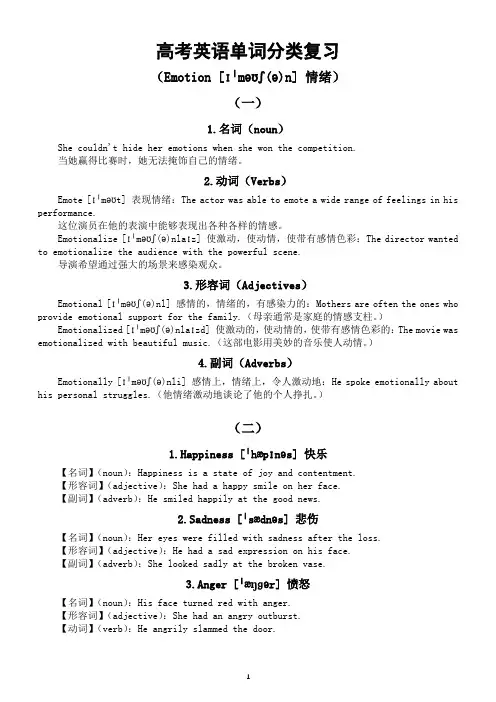
高考英语单词分类复习(Emotion [ɪˈməʊʃ(ə)n] 情绪)(一)1.名词(noun)She couldn't hide her emotions when she won the competition.当她赢得比赛时,她无法掩饰自己的情绪。
2.动词(Verbs)Emote [ɪˈməʊt] 表现情绪:The actor was able to emote a wide range of feelings in his performance.这位演员在他的表演中能够表现出各种各样的情感。
Emotionalize [ɪˈməʊʃ(ə)nlaɪz] 使激动,使动情,使带有感情色彩:The director wanted to emotionalize the audience with the powerful scene.导演希望通过强大的场景来感染观众。
3.形容词(Adjectives)Emotional [ɪˈməʊʃ(ə)nl] 感情的,情绪的,有感染力的:Mothers are often the ones who provide emotional support for the family.(母亲通常是家庭的情感支柱。
)Emotionalized [ɪˈməʊʃ(ə)nlaɪzd] 使激动的,使动情的,使带有感情色彩的:The movie was emotionalized with beautiful music.(这部电影用美妙的音乐使人动情。
)4.副词(Adverbs)Emotionally [ɪˈməʊʃ(ə)nli] 感情上,情绪上,令人激动地:He spoke emotionally about his personal struggles.(他情绪激动地谈论了他的个人挣扎。
)(二)1.Happiness [ˈhæpɪnəs] 快乐【名词】(noun):Happiness is a state of joy and contentment.【形容词】(adjective):She had a happy smile on her face.【副词】(adverb):He smiled happily at the good news.2.Sadness [ˈsædnəs] 悲伤【名词】(noun):Her eyes were filled with sadness after the loss.【形容词】(adjective):He had a sad expression on his face.【副词】(adverb):She looked sadly at the broken vase.3.Anger [ˈæŋɡər] 愤怒【名词】(noun):His face turned red with anger.【形容词】(adjective):She had an angry outburst.【动词】(verb):He angrily slammed the door.4.Love [lʌv] 爱【名词】(noun):Their love for each other was evident in their actions.【形容词】(adjective):She had a loving relationship with her partner.【动词】(verb):He loved her deeply.5.Fear [fɪər] 害怕【名词】(noun):He felt a wave of fear wash over him.【形容词】(adjective):She had a fearful look in her eyes.【动词】(verb):They feared the unknown.6.Surprise [səˈpraɪz] 惊讶【名词】(noun):She couldn't hide her surprise when she saw the gift.【形容词】(adjective):He had a surprised expression on his face.【动词】(verb):They surprised her with a birthday cake.7.Jealousy [ˈdʒɛləsi] 嫉妒【名词】(noun):Her jealousy was evident when she saw her ex with someone else. 【形容词】(adjective):He had a jealous reaction to his friend's success.【动词】(verb):She jealously guarded her possessions.8.Amusement [əˈmjuːzmənt] 娱乐【名词】(noun):The children watched the clown with amusement.【形容词】(adjective):He had an amused smile on his face.【动词】(verb):They amused themselves with games and jokes.9.Entertainment [ˌɛntərˈteɪnmənt] 娱乐【名词】(noun):The concert provided great entertainment for the audience.【形容词】(adjective):He had an entertaining performance.【动词】(verb):The magician entertained the crowd with his tricks.10.Fright [fraɪt] 惊吓【名词】(noun):She let out a scream of fright.【形容词】(adjective):He had a frightened look on his face.【动词】(verb):The sudden noise frightened the birds away.11.Relief [rɪˈliːf] 宽慰【名词】(noun):He felt a sense of relief when he found his lost keys.【形容词】(adjective):She had a relieved expression on her face.【动词】(verb):They were relieved to hear the good news.12.Excited [ɪkˈsaɪtɪd] 兴奋的【名词】(noun):Her excitement was palpable as she prepared for her trip.【形容词】(adjective):He had an excited look on his face.【副词】(adverb):She spoke excitedly about her upcoming event.13.Nervous [ˈnɜːrvəs] 紧张的【名词】(noun):His nervousness before the presentation was evident in his shaky hands.【形容词】(adjective):She had a nervous expression on her face.【副词】(adverb):He paced nervously back and forth.14.Depressed [dɪˈprest] 沮丧的【名词】(noun):His depression made it difficult for him to find joy in anything. 【形容词】(adjective):She had a depressed demeanor.【副词】(adverb):He spoke quietly and depressedly about his struggles.15.Content [kənˈtent] 满意的【名词】(noun):She felt a deep sense of contentment in her peaceful surroundings. 【形容词】(adjective):He had a content smile on his face.【副词】(adverb):They lived contentedly in their small cottage.16.Confused [kənˈfjuːzd] 困惑的【名词】(noun):His confusion was evident as he tried to solve the complex problem. 【形容词】(adjective):She had a confused expression on her face.【副词】(adverb):He looked around confusedly, unsure of where he was.17.Surprised [səˈpraɪzd] 惊讶的【名词】(noun):Her surprise was evident when she received the unexpected gift. 【形容词】(adjective):He had a surprised look on his face.【副词】(adverb):They reacted surprisedly to the sudden news.18.Worried [ˈwʌrid] 担心的【名词】(noun):His worry kept him up at night, unable to sleep.【形容词】(adjective):She had a worried expression on her face.【副词】(adverb):He paced worriedly, waiting for the test results.19.Envious [ˈɛnvɪəs] 羡慕的【名词】(noun):Her envy was apparent when she saw her friend's success.【形容词】(adjective):He had an envious reaction to his colleague's promotion. 【副词】(adverb):She looked at him enviously, wishing for the same opportunity.20.Amused [əˈmjuːzd] 开心的【名词】(noun):He couldn't help but burst into laughter, his amusement overwhelming. 【形容词】(adjective):She had an amused smile on her face.【副词】(adverb):They watched the comedy show amusedly, enjoying every moment.21.Entertained [ˌɛntərˈteɪnd] 娱乐的【名词】(noun):The entertainers provided great entertainment for the audience. 【形容词】(adjective):He had an entertained expression on his face.【副词】(adverb):She clapped and cheered entertainedly throughout the performance.22.Frightened [ˈfraɪtənd] 害怕的【名词】(noun):His frightened state was evident in his trembling hands.【形容词】(adjective):She had a frightened look on her face.【副词】(adverb):He ran frightenedly away from the loud noise.23.Relieved [rɪˈliːvd] 宽慰的【名词】(noun):She felt a wave of relief wash over her when she found her lost wallet.【形容词】(adjective):He had a relieved expression on his face.【副词】(adverb):They sighed relievedly, knowing that the danger had passed.24.Reluctantly [rɪˈlʌktəntli] 不情愿地【副词】(adverb):She agreed to go on the trip, but reluctantly.Reluctant [rɪˈlʌktənt] 不情愿的【形容词】(adjective):She was reluctant to share her personal experiences with others.Reluctance [rɪˈlʌktəns] n. 不情愿,勉强【名词】(noun):His reluctance to participate in the project was evident.25.Frighteningly [ˈfraɪtənɪŋli] 令人恐惧地【副词】(adverb):The thunder roared frighteningly, sending chills down their spines.Frightening [ˈfraɪtənɪŋ] 令人恐惧的【形容词】(adjective):The horror movie had a frightening effect on the audience.Fright [fraɪt] n. 惊吓,恐惧【名词】(noun):He couldn't move, paralyzed with fright.26.Amusingly [əˈmjuːzɪŋli] 有趣地【副词】(adverb):He recounted the funny incident amusingly, making everyone in the room laugh.Amusing [əˈmjuːzɪŋ] 有趣的【形容词】(adjective):The comedian delivered an amusing performance that kept the audience entertained.Amused [əˈmjuːzd] 开心的【形容词】(adjective):He had an amused smile on his face as he watched the funny video.Amusement [əˈmjuːzmənt] n. 娱乐,乐趣【名词】(noun):The amusement park was filled with laughter and excitement.Enviously [ˈɛnvɪəsli] 羡慕地【副词】(adverb):She looked at her friend's new car enviously, wishing she had one too.Envious [ˈɛnvɪəs] 羡慕的【形容词】(adjective):She had an envious expression on her face as she watched others receive awards.Envy [ˈɛnvɪ] n. 羡慕,嫉妒【名词】(noun):His success brought out feelings of envy among his peers.Envy [ˈɛnvɪ] v. 羡慕,嫉妒【动词】(verb):She envied her friend's talent and wished she could sing as well.27.Joyfully [ˈdʒɔɪfəli] 快乐地【副词】(adverb):They danced joyfully at the celebration, filled with happiness and delight.Joyful [ˈdʒɔɪfəl] 快乐的She had a joyful expression on her face as she opened the birthday present.The children's laughter filled the room, creating a joyful atmosphere.Joy [dʒɔɪ] n. 快乐,喜悦The news of her success brought great joy to her family.He couldn't contain his joy when he received the good news.28.Fearfully [ˈfɪərfəli] 害怕地She looked fearfully over her shoulder, expecting something to jump out at her. Fearful [ˈfɪərfəl] 害怕的He had a fearful expression on his face as he approached the haunted house. Fear [fɪər] n. 害怕,恐惧She felt a surge of fear as she walked through the dark, deserted street.Fear [fɪər] v. 害怕,畏惧They feared the unknown and hesitated to take risks.。
高中最常用30个情感类动词及其形容词变形!1. amaze: v. 使某人吃惊;amazing:adj. 令人惊叹的;amazed:adj. 感到惊奇的2. annoy: v. 使某人恼怒;annoying:adj. 令人恼怒的;annoyed:感到恼怒的,生气的3. astonish:v. 使某人惊愕;astonishing:adj. 令人惊愕的;astonished:adj. 感到惊愕的4. confuse:v. 使某人困惑;confusing:adj. 令人困惑的;confused:adj. 感到困惑的5. convince:v. 使某人信服;convincing:adj. 令人信服的;convinced:adj. 感到信服的6. delight:v. 使某人高兴;delighting(delightful):adj. 令人高兴的; delighted:感到高兴的7. depress:v. 使人低落;depressing:adj. 令人低落(沮丧)的; depressed:感到沮丧的8. disappoint: v. 使某人失望; disappointing: adj. 令人失望的; disappointed:adj. 感到失望的9. discourage:v. 使某人泄气; discouraging:adj. 令人泄气的; discouraged:adj. 感到泄气的10. disgust:v. 使人厌恶; disgusting:adj. 令人厌恶的; disgusted:adj. 感到厌恶(恶心)的11. embarrass:v. 使人尴尬; embarrassing:adj. 令人尴尬的; embarrassed:adj. 感到尴尬的12. encourage:v. 使有勇气; encouraging:adj. 令人鼓舞的; encouraged:adj. 感到鼓舞的13. excite:v. 使人兴奋; exciting:adj. 令人兴奋的; excited:adj. 感到兴奋的14. exhaust: v. 使人筋疲力尽; exhausting:adj. 令人筋疲力尽的; exhausted:adj. 感到筋疲力尽的15. fright:v. 使人惊恐; frightening:adj. 令人惊恐的; frightened:adj. 感到恐惧(害怕)的16. frustrate:v. 使人沮丧; frustrating:adj. 令人沮丧的; frustrated:adj. 感到沮丧的17. inspire:v. 使人鼓舞; inspiring:adj. 令人鼓舞的; inspired:adj. 感到鼓舞的18. interest:v. 使人有兴趣; interesting:adj. 令人感兴趣的; interested:adj. 感到有兴趣的19. irritate:v. 使人愤怒; irritating:adj. 令人愤怒的; irritated:adj. 感到愤怒的20. move:v. 使人感动;moving:adj. 令人感动的; moved:adj. 感动的21. please:v. 使人愉快;pleasing(pleasant):adj. 令人愉快的; pleased:adj. 感到快乐的22. puzzle:v. 使人困惑;puzzling:adj. 让人困惑的;puzzled:adj. 感到困惑的23. satisfy:v. 使人满意;satisfying(satisfactory):adj. 令人满意的; satisfied:adj. 感到满意的24. shock:v. 使人震惊;shocking:adj. 令人震惊的; shocked:adj. 感到震惊的24. sicken:v. 使人恶心;sickening:adj. 令人恶心的; sickened:adj. 感到恶心的26. surprise:v. 使人惊讶; surprising:adj. 令人惊讶的; surprised:adj. 感到惊讶的27. terrify:v. 使人害怕;terrifying:adj. 令人害怕的; terrified:adj. 感到害怕的28. tire:v. 使人疲倦;tiring:adj. 令人疲倦的;tired:adj. 感到疲倦的29. touch:v. 使人触动;touching:adj. 令人触动的; touched:adj. 感到触动的30. worry:v. 使人担忧; worrying:adj. 令人担忧的; worried:adj. 感到担忧的。
情绪形容词+as+sb+be动词标题:情绪形容词+as+sb+be动词(创建与标题相符的正文并拓展)正文:“情绪形容词+as+sb+be动词”是一种常见的固定结构,可以用来描述人或事物的情绪状态。
这种结构可以用于各种语境,例如:- 描述一个人的情绪状态:My mood is currently low.(我的情绪现在是低落的。
)- 描述一种物品的情绪状态:The flowers are in high demand due to their romantic scent.(这些花朵因为它们的浪漫香味而备受欢迎。
)- 描述一个故事中人物的情绪:He was in a good mood, as he was feeling happy about the new job offer.(他心情很好,因为他正为新的工作 offer 感到高兴。
)除了用于描述人或物品的情绪状态,这种结构还可以用于其他语境,例如:- 描述一种行为或状态的原因:He was feeling moody because he had just gone through a difficult time.(他情绪低落是因为他刚刚经历了一段困难的时间。
)- 描述一种文化或社会的心理状态:The current political climate in our country is causing many people to feel沮丧或不安.(当前我们国家的政治气候导致许多人感到沮丧或不安。
)拓展:除了使用“情绪形容词+as+sb+be动词”的固定结构,我们还可以使用其他方式来描述人或事物的情绪状态。
例如:- 使用形容词短语:I am feeling very tired today.(我今天感到非常疲劳。
)- 使用动词的过去式或完成式:He had always been a good student, but this year he was failing many of his assignments.(他一直是一个优秀的学生,但今年他许多作业都不及格。
谈谈初中英语中表⽰情绪感觉的分词形容词知识讲解英语中表⽰情绪感觉的分词形容词⼀、表⽰情绪感觉的分词形容词由意为“使/让……”的及物动词加-ing或-ed构成。
学⽣应该明⽩去掉此类词的分词形式即-ing或-ed,得到的是及物动词。
这类及物动词有⼀个通⽤的句型:Sb./Sth.+Vt+Sb. 例如:What scares me most is that I'm going to fail in my English exam.最让我担⼼的是我会在英语考试中不及格。
It embarrassed him that he had no idea of what was going on.对所发⽣的事情⼀⽆所知,这让他很难堪。
⼆、表情绪感觉的V-ed分词形容词表⽰⼈⾃内⼼产⽣的⼀种感觉,故其所描述修饰的成分⼀般是有⽣命有思想的⽣物,主要是⼈,也包括有些动物。
往往译作“感到……的”,其通⽤的句型之⼀为:Sb + Link Verb(连系动词)+ V-ed {+prep.(介词) + Sb./Sth}. 例如:Roberta felt frustrated and angry. 罗伯塔既灰⼼⼜⽣⽓。
Her cat is interested in balls. 她的猫对球感兴趣。
三、表情绪感觉的V-ing分词形容词表⽰外界的⼈或事物造成的影响给⼈⼀种感觉,故此类形容词形容⼈或物均可(⽽很多的参考书上却武断地指出此类形容词⽤来形容物,这明显是不符合事实的,提醒⼤家注意)。
往往译作“令⼈……的”或“……⼈的”,其有⼀种常⽤的句式为:Sb./Sth. + Link Verb+ V-ing. 例如:Travelling is tiring. 旅⾏很累⼈。
That guy is very interesting. 那家伙很有趣。
四、绝⼤多数表⽰情绪感觉的分词形容词都有对称的V-ed和V-ing形式,但有少数词没有对应的V-ing形容词,表达此种意义时会⽤到另外⼀个词。